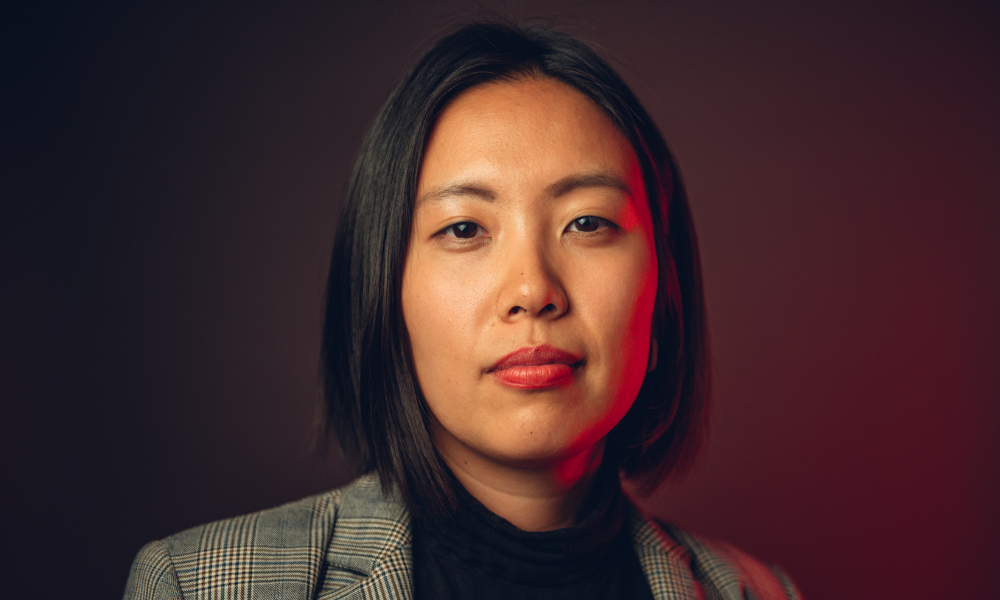Kim was recognized as a Top 25 winner for her work at the women's legal advocacy organization

For Rosel Kim, one of the biggest challenges of working at a public interest organization is saying no. As a senior staff lawyer at the Women's Legal Education and Action Fund, Kim contributes to developing and managing cases and drafts law reform submissions.
“Because we are a small team, we have limited capacity to take on different court cases or law reform projects,” she says. “So, there's a lot of deliberation on what we decide to do and what we decide not to do. Saying no to things is very hard.”
Despite this challenge, Kim has broadened the range of issues that LEAF has taken on, guided by its mandate to ensure the law guarantees substantive equality for all women, girls, trans, and non-binary people.
Kim’s interest in social justice pre-dated law school. For her master’s in English, she studied the TV show The Wire, examining the lessons the prestige HBO drama highlighted about how the justice system affects people and whether it can be reformed.
She began her career as a corporate and securities associate at Goodmans in Toronto. After a few years, she realized the role didn’t offer her what she wanted from a legal career. So, she took an in-house position at the fintech company Finastra.
Her passion for social justice was reignited by volunteer work she began while working in-house. Kim contributed time with LEAF but also started a group called the Asian Canadian Women's Alliance, where she met senior Asian lawyers like Julia Shin Doi.
So, Kim applied when a position at LEAF came up in 2019. “I knew it was a bit of a stretch, just looking at my experience. But I was hoping that my extracurricular involvements and what I studied before law school would resonate.”
In her short time with LEAF, her work has already resonated. She was recently selected as one of Canadian Lawyer’s Top 25 Most Influential Lawyers of 2023.
Kim recently acted as co-counsel for LEAF in Canadian Alliance for Sex Work Law Reform et al v. Canada (Attorney General), a case challenging the constitutionality of sex work provisions in the Criminal Code. She led LEAF’s process to develop a position on sex work, a first for the organization, and co-wrote LEAF’s position paper on this topic.
“Historically [LEAF] didn't take a position on sex work, and we were absent when [Canada (Attorney General) v. Bedford] went up to the Court of Appeal and the Supreme Court. It was something that I thought the organization should develop a position on, especially as we had identified intersectionality as one of our strategic priorities in our recent strategic plan.”
Kim helped to broaden LEAF’s mandate beyond its historical restrictions. “Our mandate includes women, girls, trans and non-binary people. That happened in 2021. As an organization, we are thinking, ' What does it mean to be a gender equality organization now, and who are we centering and who are we leaving out?’ I think having these kinds of discussions led to things like the mandate update and also the position on sex work.”
She is also leading LEAF’s technology-facilitated violence project, which explores equality-centred legal responses to this violence. Kim has co-written government submissions on this issue, including on the federal government’s proposed legislation to address harmful online content and Nova Scotia legislation addressing the non-consensual distribution of intimate images.
“We've always been involved in intervening in hate speech cases more generally,” says Kim. “Unfortunately, technology plays such a big part now in disseminating messages of hate.”
Kim says LEAF built on this work in fighting hate speech to address newer forms of harassment that technology facilitates. “Unfortunately, the law has not really caught up with the technology and the ways in which technology facilitates acts of harassment and abuse because it's so reactive. There is still a gap in really providing meaningful remedies to the survivors who are experiencing this kind of violence.”
Younger lawyers often ask her for advice about how to land a role like hers. “The reality is that jobs like this, human rights jobs, are pretty scarce. And so, it's important to keep an eye out for the openings and continue networking,” she says.
Kim tells students that even if they don’t get their dream out of law school, they should focus on the skills they are building along the way. With each job, she says, “I was asking myself what skill can I learn? What kind of people can I meet? What kind of freedom do I have to explore the opportunities that I want within this job? And I think as long as you can explore one of those things, with each job, I think you can get you closer to the job that can feel more fulfilling.”









